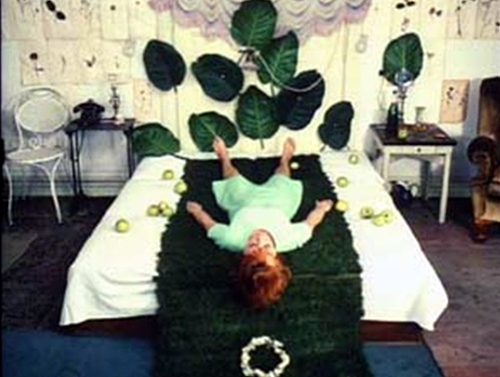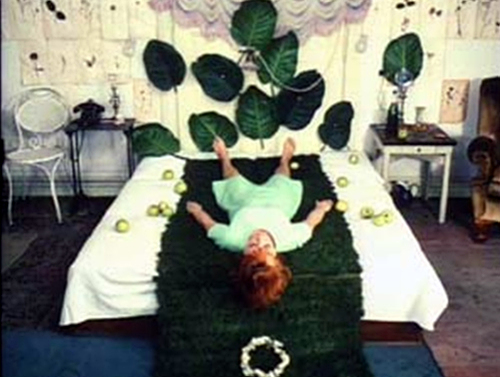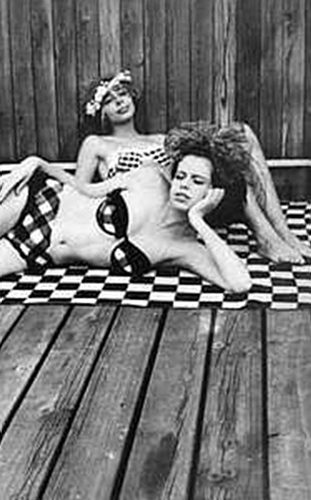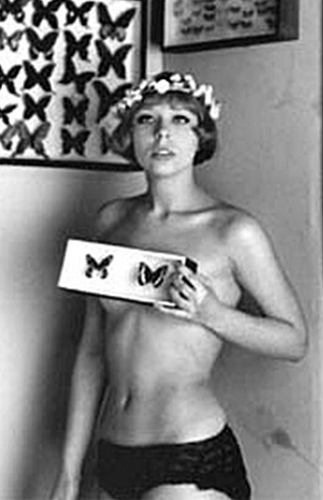7회 영화제(2005)
| 개막작 (1) | 새로운 물결 (29) |
| 영페미니스트 포럼 (11) | 한국영화회고전 : 고백하는 여자들 (4) |
| 터키영화특별전: 이슬람 문화에서 여성으로 살아가기 (7) | 감독특별전 : 베라 히틸로바 (6) |
| 여성영상공동체 (9) | 아시아 단편경선 (18) |
| 다큐멘터리 옥랑상 (1) |
데이지Daisies / Sedmikrásky
베라 히틸로바
- 체코
- 1967
- 75min
- Beta
- color
SYNOPSIS
Chytilová once remarked on Daisies as a ‘grotesque philosophical documentary’, and a ‘philosophical slapstick comedy’. These remarks only indicate the eccentricity and uniqueness of the film, which was made during the era of socialistic realism. Two girls, both named Maria, absorbed in thinking that world is ruined in every way, have decided to live in self-importance. The film exposes the girls’ sarcasm, greed and outrageous acts, only to show the realization of their destructive, self-alienating ends.
The eccentric and inexplicably humorous acts of two girls make it hard to enjoy as the film does not use the conventional forms of sympathetic protagonists nor a continuous narrative. Made during the Věra Chytilová formalism, Daisies is marked by witty images and anarchic humor via montage, stylish colors and decoration, cinematic extortion and tricks. The inventive and visually striking cinematography by Jaroslav Kucera, Chytilová husband, adds a provocative effect and fascination to this pessimistic innuendo.
Despite the difficulty in sorting it into any category, Daisies has often been interpreted as Chytilová critical mention on nihilism or existentialism and as a statement against materialism and consumerism in modern society. In truth, the film draws you in with subtlety and a compelling and thrilling fascination; Daisies is open to multiple interpretations that do not necessarily contradict each other but exist as parallel readings of a complex film. (Joo You-shin)
The eccentric and inexplicably humorous acts of two girls make it hard to enjoy as the film does not use the conventional forms of sympathetic protagonists nor a continuous narrative. Made during the Věra Chytilová formalism, Daisies is marked by witty images and anarchic humor via montage, stylish colors and decoration, cinematic extortion and tricks. The inventive and visually striking cinematography by Jaroslav Kucera, Chytilová husband, adds a provocative effect and fascination to this pessimistic innuendo.
Despite the difficulty in sorting it into any category, Daisies has often been interpreted as Chytilová critical mention on nihilism or existentialism and as a statement against materialism and consumerism in modern society. In truth, the film draws you in with subtlety and a compelling and thrilling fascination; Daisies is open to multiple interpretations that do not necessarily contradict each other but exist as parallel readings of a complex film. (Joo You-shin)
PROGRAM NOTE
Chytilová once remarked on Daisies as a ‘grotesque philosophical documentary’, and a ‘philosophical slapstick comedy’. These remarks only indicate the eccentricity and uniqueness of the film, which was made during the era of socialistic realism. Two girls, both named Maria, absorbed in thinking that world is ruined in every way, have decided to live in self-importance. The film exposes the girls’ sarcasm, greed and outrageous acts, only to show the realization of their destructive, self-alienating ends.
The eccentric and inexplicably humorous acts of two girls make it hard to enjoy as the film does not use the conventional forms of sympathetic protagonists nor a continuous narrative. Made during the Věra Chytilová formalism, Daisies is marked by witty images and anarchic humor via montage, stylish colors and decoration, cinematic extortion and tricks. The inventive and visually striking cinematography by Jaroslav Kucera, Chytilová husband, adds a provocative effect and fascination to this pessimistic innuendo.
Despite the difficulty in sorting it into any category, Daisies has often been interpreted as Chytilová critical mention on nihilism or existentialism and as a statement against materialism and consumerism in modern society. In truth, the film draws you in with subtlety and a compelling and thrilling fascination; Daisies is open to multiple interpretations that do not necessarily contradict each other but exist as parallel readings of a complex film. (Joo You-shin)
The eccentric and inexplicably humorous acts of two girls make it hard to enjoy as the film does not use the conventional forms of sympathetic protagonists nor a continuous narrative. Made during the Věra Chytilová formalism, Daisies is marked by witty images and anarchic humor via montage, stylish colors and decoration, cinematic extortion and tricks. The inventive and visually striking cinematography by Jaroslav Kucera, Chytilová husband, adds a provocative effect and fascination to this pessimistic innuendo.
Despite the difficulty in sorting it into any category, Daisies has often been interpreted as Chytilová critical mention on nihilism or existentialism and as a statement against materialism and consumerism in modern society. In truth, the film draws you in with subtlety and a compelling and thrilling fascination; Daisies is open to multiple interpretations that do not necessarily contradict each other but exist as parallel readings of a complex film. (Joo You-shin)
Director
-

베라 히틸로바Věra CHYTILOVÁ
1929년 체코 오스트라바에서 태어난 감독이자 시나리오 작가로, 초기작부터 대담하고 독창적인 면으로 주목을 받아 왔다. 평범한 일상을 비관습적인 방법으로, 예기치 못한 각도로 관찰하여 일반적인 영화 감독들의 작품 흐름과는 다른 경향을 보인다. 주요 작품으로 , , , , 등이 있고, 여러 영화제에서 상영되며 수상했다. 체코 영화의 대표적 인물인 동시에, 1960년대 ‘체코 뉴웨이브’의 기수로 알려져 있다.
Credit
- ProducerCarlo Ponti
- Cast Jitka Cerhová Ivana Karbanová Julius
- Screenwriter Věra Chytilová Ester Krumbachov?Cinema
- Editor Miroslav Hájek
- Music Jirí Slitr, Jirí Sust
- Sound Ladislav Hausdorf
PRODUCTION COMPANY
Barrandov Film Studios
Krizeneckeho nam. 5/322,
152 00, Prague 5-Barrandov, Czech Republic
Tel 420 267 072 073 Fax 420 251 816 256
Email production@barrandov.cz
WORLD SALES
Ateliéry Bonton Zlín a.s.
Filmová Zlín Czech Republic
Tel 420 224 814 445 Fax 420 224 814 447
Email vera.vicenikova@bonton.cz






